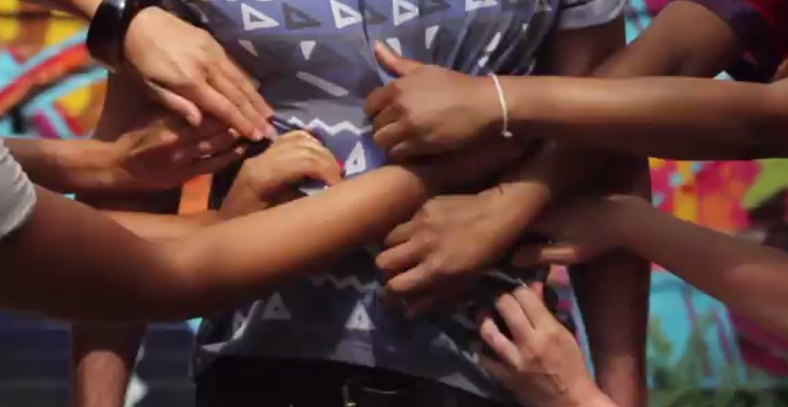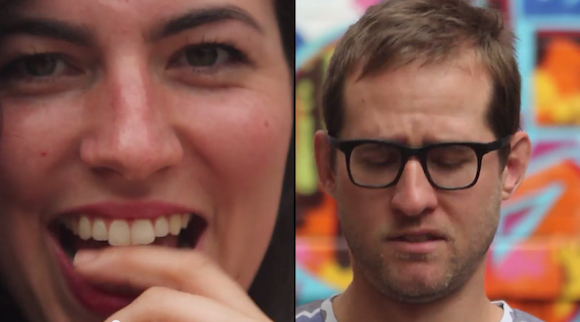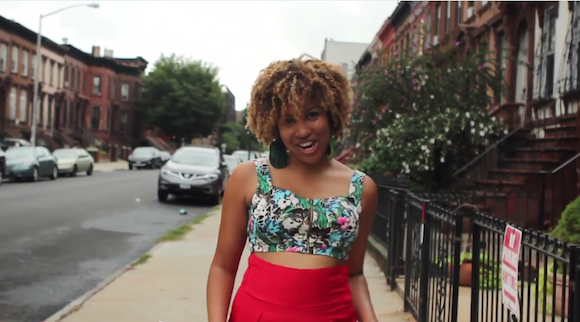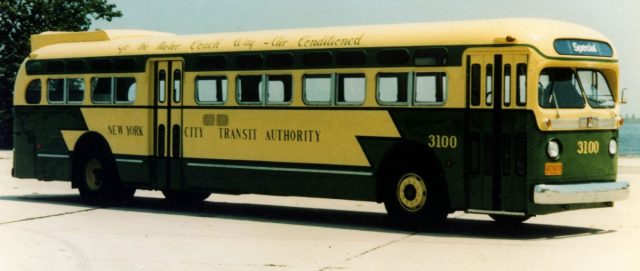Street harassment is an ongoing issue currently being experienced by women all over America, including our fair borough. Recently catcallers have had their overdue moment in the media spotlight with Hollaback’s “10 Hours Walking in New York” video, which brought the immediacy of the issue to the forefront of the national dialogue. Everyone has an opinion on catcalling, and Brooklyn’s own Shanthony Exum – who raps under the handle Miss Eaves – is no different. But instead of writing a heated Facebook status or lamenting with her friends over drinks, Miss Eaves decided to lay down a track calling out catcallers, and now she has a paradigm-shifting music video (which she co-directed with roommate Sal Caino) that makes a man the object of unwanted sexual attention. We caught up with Miss Eaves to find out what exactly inspired her to rap about the least favorite part of any woman’s commute.
What has been your personal experience with catcalling in New York City, and how has the culture inspired you to rap about it?
When I moved to New York from North Carolina, the incidences of street harassment more than tripled (probably in part because I walk around more in New York.) Sometimes, I have had something said to me as many as five times in the short distance from my house to the subway (I live in Bed-Stuy, about four blocks from the train). My qualms with street harassment are two-fold. One, the harasser is simplifying me into an object of his desire versus a complex human who is more than a physical form. Two, the harasser is trying to control how I exist in the world by telling me to “look happy” or “smile” and how I react by demanding me to say “thank you” for his unwanted “compliment.”
Art is about honesty and when I wrote “Aye Girl” I was pretty fed up with being harassed by men. It felt good to write it all down and vocalize my problems with being catcalled.

How did you feel about Hollaback’s “10 Hours Walking in New York” video, particularly, about the fact that the video was edited to show only men of color catcalling? How does race play into your video, if at all? Was it a conscious effort to make the harassed person a white male instead of a woman of color?
In making my video, I wanted my message to be “Street harassment is not okay” and not to include other issues to take away from that message. I wanted to show a range of women from different backgrounds to exemplify that women of all ethnicities are being affected by this. Jesse (P. Kilmure) who is the lead male in the video, also happens to be white. Originally I had cast a dancer who happens to be black but made a last minute substitution for Jesse. This choice really worked because it starts to change the dialogue about black men being the main perpetrators of sexual harassment.
Who or what inspires your sound and your flow? The beat of “Aye Girl” is sick, who inspires your production style?
I am really inspired by Roxanne Shante. She was the original “Bad Sister” and I love how she is all about female empowerment. As far as flow goes, MF Doom and Aesop Rock are sick and I love the complexity of their flows. I wrote “Aye Girl” first as acapella (this is how strongly I felt about the issue) and my good friend P.Kilmure agreed to make the beat.
The female rap game is typically marked by the media pinning artists against each other, and is seen as a hyper-competitive and ridiculously fraught arena thrive within. Have you found that there is a sisterhood among female rappers?
I am all about sisterhood and building up other women working in creative fields. I am in an awesome unnamed collective of female rappers which includes Hand Job Academy (Uncle Meg shot the video), Dulcinea (who is one of the harassers in my video) Tyga Paw, Lil Freckles, Blunt Mary to name a few. We all play shows together, collaborate with each other and help each other when we can. There is enough pie for everyone and there really is no point in putting other women down to get ahead.

Do you see “Aye Girl” as a reactionary song or a call to action? What would you like people to take away from the video?
“Aye Girl” is my reaction to being street harassed and I was hoping that my experience would resonate with other women. One of the defenses of street harassment I hear from men is,“I would love if women were doing it to me.” I wanted to portray in this video that no human regardless of gender would enjoy objectification, unwanted sexualization and harassment.
How do you feel about men who defend catcalling as “Just saying hi” or “Giving a compliment,” instead of an invasion of privacy?
Those guys don’t deserve the space in this interview to discuss their warped views. But one guy I want to talk about is Elon James White. His hashtag #DudesGreetingDudes is BRILLIANT. It perfectly highlights the flaws in guys saying cat calling is complimentary and benign, because they do not cat call other men. One of my favorites is, “You see a dude looking all hard & shit. Roll up on him like ‘Aye yo, smile, son. Damn.’ BRING SUNSHINE TO HIS DAY. #dudesgreetingdudes”

What advice would you give guys that think catcalling is all right?
I would ask them to think about a woman who is important to them. If the behavior is benign and they’re just being nice would they be okay doing this to that woman? To their mother? To their best friend’s wife? I would then tell them to “Smile” and “Look happy” and see how they respond. If I had made a breakthrough after that exercise I would explain to them that catcalling violates women’s personal space and makes many feel unsafe. Even if they feel like commenting on a stranger’s physical appearance or demeanor, it is best to do something else instead. Maybe eat a waffle? They’re delicious.
Check out the video for “Aye Girl” on SoundCloud, and be sure to show Miss Eaves some love on Facebook.
Leave a Reply



